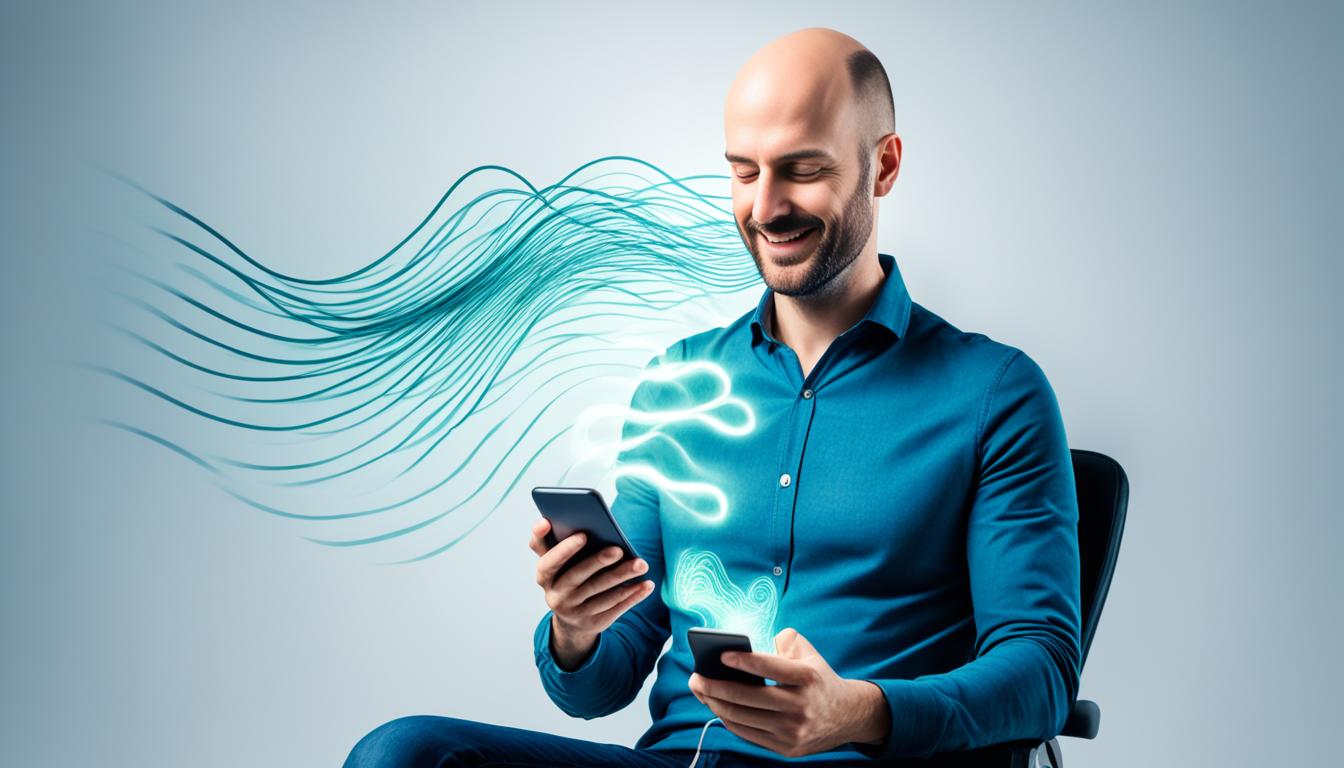Did you know that excessive screen time on smartphones may be linked to hair loss? While this connection may come as a surprise, a study published in the Journal of Cosmetology and Trichology has found a relationship between hair loss and long mobile calls, especially when the phone is held against the ear.
Exposure to cellphone radiation can lead to hair loss through DNA breakage, genotoxic effect generation of reactive oxygen species (ROS), and altered hormonal regulation. However, it is important to note that significant hair loss would only occur with prolonged and consistent exposure to cellphone radiation.
The main culprit behind hair loss associated with excessive screen time is stress, caused by poor sleep, depression, and increased cortisol production. Minimizing screen time and taking care of hair with nourishing products can help combat these hair loss symptoms.
Key Takeaways:
- Excessive screen time on smartphones may be linked to hair loss
- Cellphone radiation can lead to hair loss through DNA breakage and altered hormonal regulation
- Stress caused by screen time is a significant factor in hair loss
- Minimizing screen time and using nourishing hair products can help combat hair loss symptoms
- Consulting with a hair restoration physician is recommended for unusual patterns of hair loss
Can Phone Radiation Cause Hair Loss?
While there is no definitive evidence linking phone radiation to hair loss, there have been anecdotal reports of hair loss possibly resulting from heavy mobile phone usage. A study published in the Journal of Cosmetology and Trichology examined a case where a patient experienced hair loss around the area where he held his phone against his ear. The study suggests that prolonged exposure to cell phone radiation can lead to hair loss through DNA breakage, genotoxic and hormonal effects, and disruption of the hair growth cycle. However, more research is needed to conclusively determine the connection between phone radiation and hair loss. It is important to note that the primary concern with excessive phone usage is the damage it can cause to other cells in the body and the potential for other health issues.
In recent years, concerns about the effects of smartphone radiation on human health have increased. The widespread use of cellphones has led to concerns about the potential risks associated with prolonged exposure to radiation. One area of concern is the possible link between cellphone radiation and hair loss. While smartphone radiation is a relatively new topic of research, there have been studies suggesting a potential connection between radiation exposure and hair loss.
In a study published in the Journal of Cosmetology and Trichology, researchers examined the case of a patient who experienced hair loss in the area where he held his cellphone against his ear. The study suggested that prolonged exposure to cellphone radiation could lead to hair loss through various mechanisms, including DNA breakage, genotoxic effects, hormonal changes, and disruptions in the hair growth cycle. However, it is important to note that more research is needed to fully understand the relationship between cellphone radiation and hair loss.
While there is no definitive evidence linking cellphone radiation to hair loss, anecdotal reports and limited studies have raised concerns about the potential effects of prolonged exposure. The primary concern with excessive cellphone usage is the damage it can cause to cells in the body, including hair follicles. Frequent and prolonged exposure to cellphone radiation may disrupt the natural hair growth cycle, leading to increased hair shedding and eventual hair loss.
It is important to note that the symptoms of radiation-induced hair loss may vary from person to person. Some individuals may experience thinning of the hair, while others may notice patchy hair loss in specific areas. Additionally, other factors such as genetics, age, and underlying medical conditions can also contribute to hair loss.
While further research is needed to establish a definitive link between cellphone radiation and hair loss, individuals concerned about the potential effects of radiation exposure can take steps to minimize their risk. These include:
- Reducing overall cellphone usage
- Keeping cellphone calls short and using hands-free devices
- Using devices with lower specific absorption rate (SAR) values
- Maintaining a healthy lifestyle and managing stress levels
- Using hair care products that promote hair health and growth
In conclusion, while the exact relationship between cellphone radiation and hair loss is still not fully understood, it is important to be aware of the potential risks associated with excessive cellphone usage. By taking proactive steps to minimize exposure and maintain overall hair health, individuals can reduce the likelihood of experiencing radiation-induced hair loss.
Conclusion
While the link between cellphone radiation and hair loss is not yet fully understood, it is essential to be aware of the potential risks associated with excessive screen time. The effects of cellphone radiation on hair are still being researched, but stress, poor sleep, and hormonal imbalances caused by screen time can contribute to hair loss symptoms.
Minimizing screen time, especially before bedtime, can help improve sleep quality and reduce stress levels, potentially minimizing radiation-related hair loss symptoms. Additionally, nourishing and strengthening hair with suitable hair care products can help combat hair loss. It is always wise to consult with a hair restoration physician if you notice unusual patterns of hair loss near where you hold your phone, in order to determine the underlying cause and explore potential treatment options.
Although more research is needed to conclusively determine the exact effects of cellphone radiation on hair, being mindful of our screen time and taking proactive steps to prioritize our hair health can contribute to overall well-being. By balancing technology use and self-care, we can work towards minimizing the potential negative impacts of excessive cellphone radiation on our hair.
FAQ
Can excessive smartphone radiation cause hair loss?
While there is no definitive evidence linking phone radiation to hair loss, there have been anecdotal reports of hair loss possibly resulting from heavy mobile phone usage. More research is needed to conclusively determine the connection between phone radiation and hair loss.
Is there any research that suggests a link between cellphone radiation and hair loss?
A study published in the Journal of Cosmetology and Trichology examined a case where a patient experienced hair loss around the area where he held his phone against his ear. The study suggests that prolonged exposure to cell phone radiation can lead to hair loss through various mechanisms. However, more research is needed to fully understand this link.
How does excessive screen time contribute to hair loss?
Excessive screen time, especially on smartphones, can contribute to hair loss through factors such as stress, poor sleep, and hormonal imbalances. These factors can disrupt the hair growth cycle and lead to hair loss. Minimizing screen time and taking care of your hair with nourishing products can help combat these hair loss symptoms.
What can I do to reduce the potential risks associated with phone radiation?
Minimizing screen time, especially before bedtime, can help improve sleep quality and reduce stress levels. Additionally, nourishing and strengthening your hair with suitable hair care products can help combat hair loss symptoms associated with excessive screen time. If you notice unusual patterns of hair loss near where you hold your phone, it is recommended to consult with a hair restoration physician to determine the underlying cause and explore potential treatment options.
Are there any specific symptoms of hair loss caused by cellphone radiation?
Hair loss caused by cellphone radiation may present as thinning hair or hair loss around the area where the phone is frequently held against the head. However, it is important to note that these symptoms can also be caused by other factors, and a thorough evaluation by a medical professional is necessary to determine the underlying cause.

